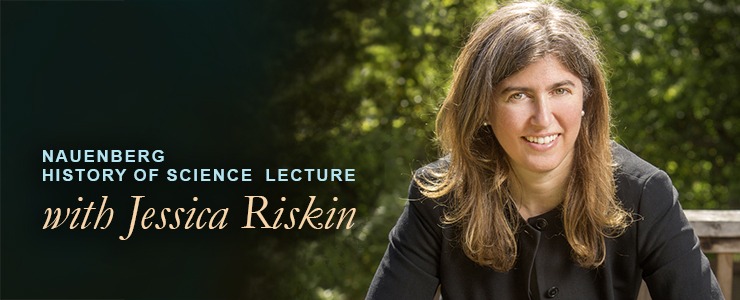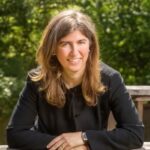Events

- This event has passed.

Nauenberg History of Science Lecture with Jessica Riskin
May 8, 2025 @ 5:30 pm | The Seymour Marine Discovery Center
Professor of Insects and Worms: Jean-Baptiste Lamarck and his Life-Made World
Jean-Baptiste Lamarck (1744-1829) was the Professor of Insects and Worms at the Museum of Natural History in Paris. Living through the storms of the French Revolution and Napoleonic period, he founded biology, coining the term to name a new science devoted to all and only living things, and authored the first theory of evolution. Lamarck’s science was foundational to modern biology, yet its radicalism – he usurped God’s monopoly on Creation and re-assigned it to mortal, living beings – brought him and his ideas plenty of trouble. During Lamarck’s lifetime, Napoleon and his scientific inner circle hated him and did what they could to undermine him. Charles Darwin then adopted central elements of Lamarck’s theory, but after Darwin’s death, his most influential followers re-interpreted his theory to eradicate all traces of Lamarckism, rendering organisms once again the passive objects of outside forces, allowing room for an omnipotent God working behind the scenes. This conception of living organisms as passive in the evolutionary process has remained dominant since the turn of the twentieth century. In contrast, in Lamarck’s theory, living beings were active, creative, self-making and world-making. Elements of this very different conception of living organisms have recently, gradually been returning to mainstream biology in fields such as niche construction and epigenetic inheritance. The lecture will present Lamarck’s radical, embattled, and perhaps re-emerging approach to living things, their evolutionary and ecological agency, and the science that studies them.
May 8, 2025
Reception 5 p.m.
Lecture 5:30 p.m.
La Feliz Room, Seymour Marine Discover Center and Virtual
Free and open to the public
 Jessica Riskin is Frances and Charles Field Professor of History at Stanford University where she teaches modern European history and the history of science. Her work examines the changing nature of scientific explanation, the relations of science, culture and politics, and the history of theories of life and mind. Her books include The Restless Clock: A History of the Centuries-Long Argument over What Makes Living Things Tick (2016), which was awarded the 2021 Patrick Suppes Prize in the History of Science from the American Philosophical Society, and Science in the Age of Sensibility (2002), which received the American Historical Association’s J. Russell Major prize for best book in French history. She is a regular contributor to various publications including Aeon, the Los Angeles Review of Books and the New York Review of Books.
Jessica Riskin is Frances and Charles Field Professor of History at Stanford University where she teaches modern European history and the history of science. Her work examines the changing nature of scientific explanation, the relations of science, culture and politics, and the history of theories of life and mind. Her books include The Restless Clock: A History of the Centuries-Long Argument over What Makes Living Things Tick (2016), which was awarded the 2021 Patrick Suppes Prize in the History of Science from the American Philosophical Society, and Science in the Age of Sensibility (2002), which received the American Historical Association’s J. Russell Major prize for best book in French history. She is a regular contributor to various publications including Aeon, the Los Angeles Review of Books and the New York Review of Books.
Nauenberg History of Science Lecture
The Nauenberg History of Science Lecture was established in honor of Michael Nauenberg, a founding faculty member in the Physics Department at UCSC who came to the campus in 1966. During his distinguished academic career, he contributed to a remarkably broad range of fields, including particle physics, condensed matter physics, astrophysics, chaos theory, fluid dynamics, and the history of physics in the 17th-18th centuries.
Amongst Professor Nauenberg’s passions, he deeply believed in the importance of interdisciplinary scholarship connecting the sciences with the humanities. Following his retirement in 1994, he pursued his long-standing interests in the history of science, writing books and articles about Joseph Banks, Robert Hooke, Christiaan Huygens, and Isaac Newton. The Nauenberg History of Science Lecture series aims to bring the best historians of science to UCSC to share the importance of this interdisciplinary work with faculty, students, and interested community members. You can support the series by contributing here.
The Nauenberg History of Science Lecture is presented by the UC Santa Cruz Emeriti Association and co-sponsored by the Ecology and Evolutionary Biology Department, History Department, and Science and Justice Research Center.

